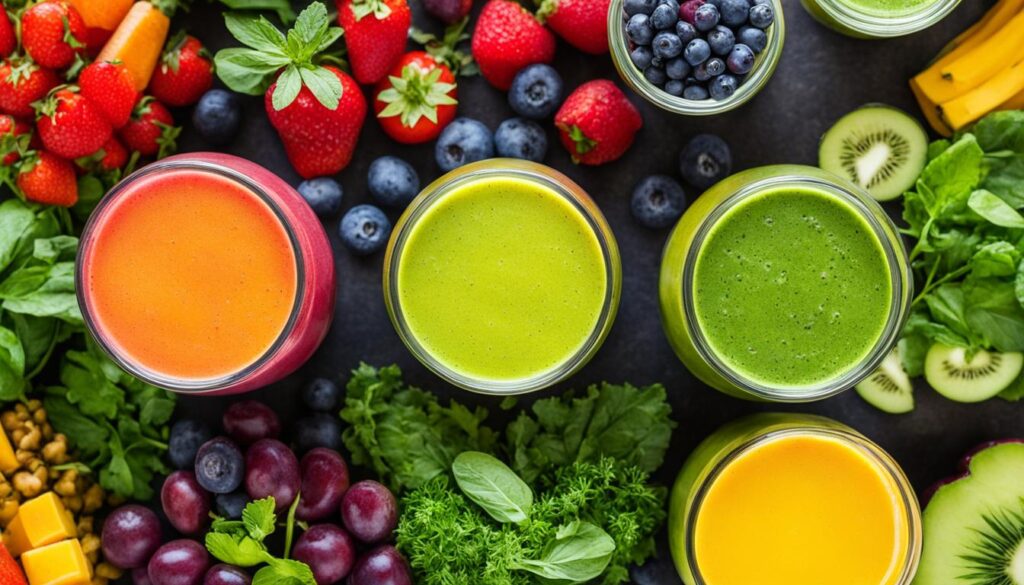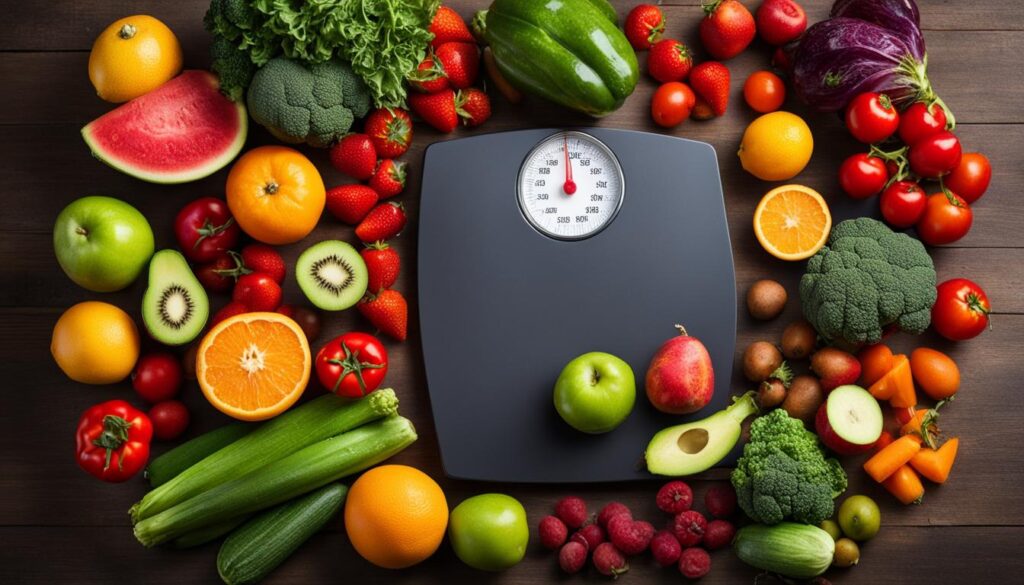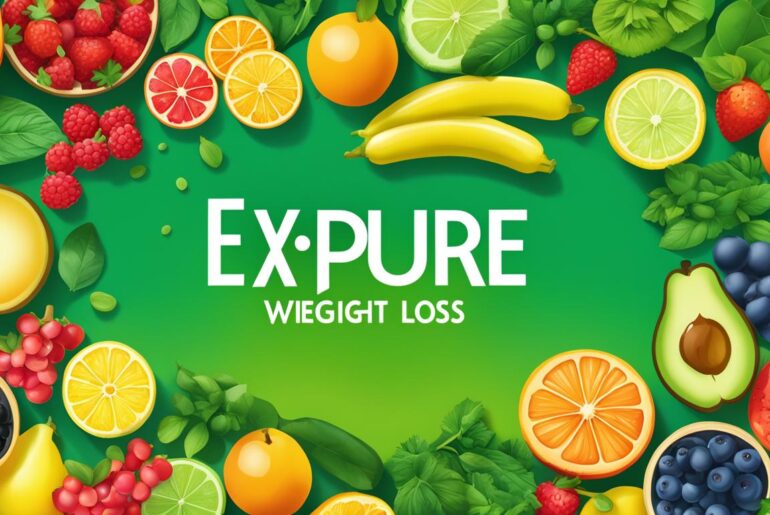Detox diets have gained popularity as a method for quick fat loss. While the effectiveness of these diets is still uncertain, they generally involve short-term dietary interventions designed to eliminate toxins from the body. The diets typically include periods of fasting, followed by a strict diet of fruits, vegetables, juices, and water. Some detox plans also incorporate herbs, teas, supplements, and colon cleanses. These diets are claimed to promote weight loss, improve digestion, boost energy, and eliminate harmful substances from the body.
However, scientific research on detox diets remains limited and flawed, making it difficult to determine their true effectiveness. While some individuals may experience short-term weight loss during detox diets, it is important to approach these diets with caution and consult with a healthcare professional before embarking on any detox diet or weight loss regimen.
Key Takeaways:
- Detox diets aim to eliminate toxins from the body through short-term dietary interventions.
- These diets often involve periods of fasting and strict consumption of fruits, vegetables, juices, and water.
- Scientific research on detox diets is limited and flawed, making it difficult to determine their true effectiveness.
- Approach detox diets with caution and consult with a healthcare professional before starting.
- Focus on sustainable clean eating, balanced nutrition, regular exercise, and healthy lifestyle habits for long-term weight loss and overall health.
What Is a Detox?
A detox diet is a short-term dietary intervention designed to eliminate toxins from the body. It typically involves periods of fasting, followed by a strict diet consisting of fruits, vegetables, fruit juices, and water. Some detox plans may also include herbs, teas, supplements, and colon cleanses.
The main goals of a detox diet are to rest the organs by fasting, stimulate the liver to eliminate toxins, promote toxin elimination through feces, urine, and sweat, improve circulation, and provide the body with healthy nutrients.
Detox diets are often recommended to address potential exposure to toxic chemicals in the environment or diet, as well as various health problems such as obesity, digestive issues, autoimmune diseases, inflammation, allergies, bloating, and chronic fatigue.
However, scientific evidence supporting the efficacy of detox diets is lacking, and existing studies are flawed.
| Pros of Detox Diets | Cons of Detox Diets |
|---|---|
| Resting organs | Lack of scientific evidence |
| Stimulating liver function | Potential nutrient deficiencies |
| Enhancing toxin elimination | Short-term effects |
| Improving circulation | Possible side effects |
| Providing healthy nutrients | Not suitable for everyone |
The Most Common Ways to Detox

When it comes to detox diets, there are a variety of approaches you can take to cleanse your body and promote overall well-being. These detox methods typically involve fasting or making modifications to your food intake. Below are some of the most common ways to detox:
- Fasting: Many detox diets include periods of fasting, where you abstain from consuming solid foods for a certain period of time. This can range from a 24-hour fast to a more extended fast lasting up to three days.
- Fruit and vegetable juices: Consuming fresh fruit and vegetable juices is a popular detox method. These juices provide essential vitamins, minerals, and antioxidants while giving your digestive system a break.
- Specific liquids: Some detox diets recommend drinking specific liquids such as salted water or lemon juice to help stimulate cleansing and elimination processes in the body.
- Eliminating heavy metals and allergens: Detox diets often involve eliminating foods that are high in heavy metals, contaminants, and allergens. This can help reduce inflammation and support the body’s natural detoxification processes.
- Supplements: Taking supplements or herbs can help support your body’s detoxification pathways. These supplements might include ingredients like milk thistle, turmeric, or activated charcoal.
- Avoiding allergenic foods: Some detox diets recommend avoiding common food allergens such as gluten, dairy, soy, and refined sugar. Eliminating these foods can help identify if they are contributing to any underlying health issues.
- Laxatives, colon cleanses, and enemas: These methods are sometimes used in detox diets to promote bowel movements and remove waste buildup in the colon. However, it’s important to consult with a healthcare professional before incorporating these strategies.
- Exercising: Regular exercise can support the detoxification process by increasing circulation, promoting sweating, and boosting overall metabolism. Engaging in activities like cardio, strength training, and yoga can be beneficial.
- Eliminating alcohol, coffee, cigarettes, and refined sugar: Avoiding these substances can help reduce the toxic load on your body and improve your overall health.
Remember that the intensity and duration of detox diets can vary, so it’s essential to choose a method that aligns with your health goals and consult with a healthcare professional before making any significant changes to your diet or lifestyle.
Expert Tip:
“When selecting a detox diet, it’s important to focus on nutrient-rich foods and listen to your body. Avoid extreme fasting or prolonged periods of calorie restriction, as these can have negative effects on your overall health.”
– Dr. Sarah Peterson, Registered Dietitian
Which Toxins Are Eliminated?
Detox diets claim to eliminate toxins from the body, but they often do not specify the specific toxins they target. It remains unclear how these diets work and if they are effective in removing toxins.
The body has its own natural detoxification processes, primarily carried out by the liver. The liver plays a crucial role in eliminating toxins from the body through feces, urine, and sweat.
While detox diets may claim to target specific toxins such as persistent organic pollutants (POPs), phthalates, bisphenol A (BPA), and heavy metals, there is limited scientific evidence to support their effectiveness in removing these compounds.
Did you know? The liver is responsible for breaking down toxins and eliminating them from the body through various pathways, including urine, feces, and sweat.
Furthermore, many of these toxic compounds, such as phthalates and BPA, have been limited in commercial products today due to increased awareness and regulations. As a result, the need for detoxification may be reduced.
The effectiveness of detox diets in eliminating specific toxins is still largely uncertain and subject to ongoing scientific research (check out my post on effectiveness of detox diets here).
Types of Toxins Targeted in Detox Diets:
- Persistent organic pollutants (POPs)
- Phthalates
- Bisphenol A (BPA)
- Heavy metals
While these toxins may be associated with various health concerns, more research is needed to determine the efficacy of detox diets in their elimination.
How Effective Are These Diets?

The effectiveness of detox diets is still unclear, as there is limited research on their specific health effects. While some individuals report feeling more focused and energetic during and after detox diets, these effects may be attributed to eliminating processed foods and unhealthy substances from the diet. Detox diets may lead to short-term weight loss, particularly if they involve severe calorie restriction. However, most of the weight loss may be due to loss of water and carbohydrate stores rather than fat. Detox diets may also have effects on stress levels, as they can resemble short-term or intermittent fasting regimes, which may improve certain disease markers in some individuals.
Some potential benefits of detox diets include avoiding dietary sources of toxins, losing excessive fat, exercising and sweating regularly, eating whole, nutritious foods, limiting stress, and getting good sleep.
| Benefits of Detox Diets |
|---|
| Feeling focused and energetic |
| Potential weight loss |
| Short-term fasting |
| Potential health benefits |
| Avoiding dietary sources of toxins |
| Losing excessive fat |
| Exercising and sweating regularly |
| Eating whole, nutritious foods |
| Limiting stress |
| Getting good sleep |
However, it is important to note that these benefits can also be achieved through a balanced and healthy eating pattern, without the need for strict detox diets.
Safety and Side Effects

Detox diets come with potential side effects and risks that should be carefully considered before embarking on such a program. It is important to be aware of the potential dangers and to consult with a healthcare professional before starting any detox diet. Some of the common side effects and risks associated with detox diets include:
- Severe calorie restriction: Detox diets often involve severe calorie restriction, which can lead to fatigue, irritability, and a lack of energy. The body may not receive sufficient nutrients, vitamins, and minerals, resulting in nutrient deficiencies that can have negative effects on overall health.
- Electrolyte imbalance: Long-term fasting or severe calorie restriction can disrupt the body’s electrolyte balance, which can lead to weakness, muscle cramps, and even cardiac arrhythmias.
- Colon cleansing methods: Some detox diets recommend colon cleansing methods such as laxatives or enemas to remove toxins from the body. However, these methods can cause dehydration, cramping, bloating, and nausea. They can also disrupt the natural balance of the gut microbiota, which is essential for overall digestive health.
- Overdosing on supplements: Detox diets may involve the use of supplements, which can be dangerous if taken in excessive amounts. It is important to follow the recommended dosage and consult with a healthcare professional before taking any supplements.
- Lack of regulation: The detox industry is not well-regulated, and the accuracy of ingredient labels on detox products may be questionable. There is limited oversight and quality control, which increases the risk of consuming potentially harmful substances.
- Potential risks for at-risk populations: Detox diets are not suitable for everyone, especially certain populations such as children, adolescents, older adults, those who are malnourished, pregnant or lactating women, and individuals with blood sugar issues or eating disorders. These groups may have specific nutrient needs that cannot be met through severe calorie restriction or fasting.
| Side Effects and Risks | Description |
|---|---|
| Severe calorie restriction | Fatigue, irritability, bad breath, energy and nutrient deficiencies |
| Electrolyte imbalance | Weakness, muscle cramps, cardiac arrhythmias |
| Colon cleansing methods | Dehydration, cramping, bloating, nausea |
| Overdosing on supplements | Potential harm from excessive supplement intake |
| Lack of regulation | Potential consumption of harmful substances |
| Potential risks for at-risk populations | Not suitable for children, adolescents, older adults, malnourished individuals, pregnant or lactating women, and individuals with blood sugar issues or eating disorders |
It is important to prioritize overall health and well-being when considering a detox diet. Rather than focusing on quick fixes or drastic measures, maintaining a balanced and healthy eating pattern is a more sustainable approach to long-term weight management and overall health.
Potential Benefits

While the effectiveness of detox diets is still uncertain, there are potential health benefits associated with certain aspects of these diets.
- Avoiding dietary sources of toxins: Detox diets emphasize the consumption of whole, nutritious foods, which can help reduce exposure to harmful substances found in processed and unhealthy foods.
- Losing excessive fat: Detox diets often include calorie restriction, which can lead to short-term weight loss, particularly if combined with regular exercise and increased sweating.
- Exercising and sweating regularly: Physical activity and sweating can aid in eliminating toxins from the body, supporting the detoxification process.
- Eating whole, nutritious foods: Detox diets promote the consumption of nutrient-dense foods, such as fruits, vegetables, and lean proteins, which provide essential vitamins, minerals, and antioxidants.
- Drinking water and green tea: Staying hydrated and consuming green tea can help flush out toxins and promote overall well-being.
- Limiting stress: Detox diets often incorporate stress-reducing activities such as meditation or relaxation techniques, which can have positive effects on mental and physical health.
- Relaxing: Taking time to unwind and relax can help reduce stress and improve overall well-being.
- Getting good sleep: Sufficient sleep is crucial for the body’s natural detoxification and rejuvenation processes.
It is important to note that these potential benefits can also be achieved through a balanced and healthy eating pattern, without the need for strict detox diets.
Conclusion
Detox diets have gained popularity for their alleged benefits in weight loss and detoxification. However, it is important to note that the effectiveness of these diets is still uncertain, and there is a lack of scientific research supporting their claims. While some individuals may experience short-term weight loss and improvements in certain disease markers during detox diets, these effects may be attributed to other factors such as calorie restriction or the elimination of processed foods.
Furthermore, many detox diets come with potential risks and side effects, and they are not suitable for everyone. Instead of relying solely on detox diets, a more sustainable approach to weight loss and overall health is to focus on clean eating, balanced nutrition, regular exercise, and healthy lifestyle habits. By practicing long-term weight maintenance through a balanced and healthy eating pattern, you can achieve your weight loss goals in a safe and effective manner.
It is crucial to consult with a healthcare professional before embarking on any detox diet or weight loss regimen to ensure it aligns with your personal health needs and goals. By incorporating science-backed approaches and adopting healthy habits, you can achieve long-lasting weight management and promote overall well-being.




